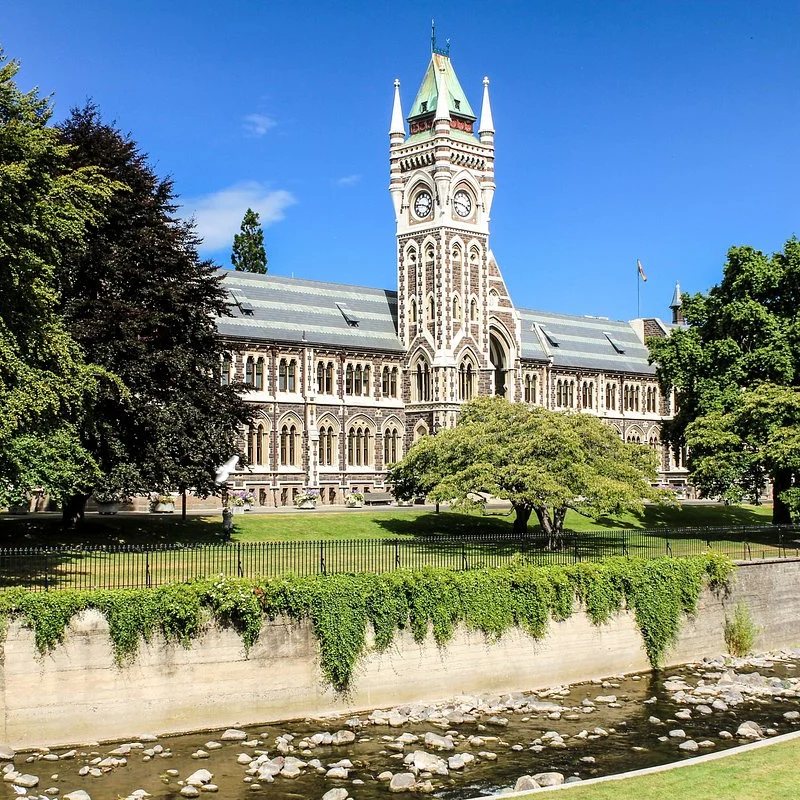
Announcements

Announcements
New Zealand has been identified as the 8th best study abroad destination, enticing international students with its exceptional safety per Global Peace Index, low corruption, & crime rates. The world-renowned universities in New Zealand offer a top-notch education, while the country's work-life balance and stunning lifestyle add to its allure. As of a recent report released by several universities in 2025, 59,000+ international students have applied & enrolled to Study In New Zealand & among these 10%+ solely represent Indian students.
However, with over 20,000 vacancies annually and the introduction of Green List Occupations post-pandemic, the number of applications to Study in New Zealand For Indian Students has only grown stronger. So, if you are also looking for your abroad education journey, connect with abroad education consultants at Meridean Overseas & plan your ideal career with us.
If you are planning to enroll to Study in New Zealand, then you should start by reviewing the crucial highlights listed below.
| Total Universities in New Zealand | 08 |
| Universities Ranking in Top 100 Globally | 01 (2025) |
| Education Levels | Primary, Secondary & Tertiary |
| Tertiary Education Regulator | New Zealand Qualifications Framework (NZQF) |
| ELP Test Scores Required | TOEFL / IELTS / PTE / Duolingo |
| Standardised Test Scores Accepted | UG: SAT / NEET UG / LSAT PG: GRE / GMAT / MCAT |
| Undergraduate Admission Eligibility | 12th scores + Entrance Test scores + ELP scores |
| Postgraduate (Taught & Research) Admission Eligibility | Bachelor’s degree + Entrance Test scores + ELP scores |
| NZ Qualifications Recognised | Globally |
| New Zealand University Acceptance Rate | Highly selective (90%) |
Before studying in New Zealand, it is essential to understand total expenses, including tuition fees, transportation, food, accommodation, and other expenses. Knowing these estimated costs helps manage finances when deciding to Study in New Zealand For Indian Students.
Numerous internal and external factors, including the program's level and preferred university, will affect the Study in New Zealand Cost of the various programs available nationwide.
| Level of Education | Tuition Range (NZD) | Tuition Range (INR) |
|---|---|---|
| Undergraduate Bachelor Degree | NZD 22,000 - NZD 32,000 | INR 10.38 Lakhs - 16.61 Lakhs |
| Postgraduate Master’s Degree | NZD 26,000 - NZD 37,000 | INR 13.50 Lakhs - 19.21 Lakhs |
| Doctoral Degree | NZD 6,500 - NZD 9,000 | INR 3.37 Lakhs - 4.67 Lakhs |
It is also very important that you know the whole cost apart from the tuition fees to study abroad New Zealand. This is why so many students prefer exploring scholarships for indian students. These scholarships can help you get relieved from at least some of the expenses. Some of the scholarships can cover a whole lot than just some part of your tuition fees.
Find the right path with Meridean
While you select a university, you need to consider many things, like your area of interest, your past academic experience, the cost of studying, and much more. Also, you should know your best options so that you can review them closely before sending the applications. All the top universities in New Zealand provide all three intakes and welcome international students with open arms.

#65
QS World Ranking

#214
QS World Ranking

#235
QS World Ranking

#239
QS World Ranking

#244
QS World Ranking

#261
QS World Ranking

#371
QS World Ranking

#412
QS World Ranking
You can find essential details on the New Zealand admission process below.
| Admission Requirements | Details |
|---|---|
| English Proficiency |
TOEFL iBT: 79-100
PTE: 58-76
IELTS: 6.0-7.0
|
| Academic Requirementsy |
Undergrad: 55% aggregate
Grad: GPA 3.0
Diploma: HS completion
|
| Documents Required | GPA, LORs, SoP, Transcripts, CV, Visa |
| Financial Docs | Bank statements, Deposits, Loan papers |
| Interview | With the admission committee for acceptance |
| Student Visa | Uni acceptance, Funds proof, Insurance |
| Other Requirements | Test scores, Health insurance, Passport |
Connect With Meridean & Get Your Abroad Education Dream Fulfilled
Different courses and institutions in New Zealand have varying application deadlines, so stay updated with relevant deadlines.
New Zealand primarily offers admissions twice a year, divided into Semester I and Semester II:
All intakes in New Zealand have the majority of students and courses, especially for long-term courses. It is the most approached intake by international students because all of them are highly significant. So, you need to check whether the course you want to enrol in is available in the intake or not, but make sure you check before the New Zealand February intake deadline. Students need to check all requirements and fulfil them before time so that they do not miss out on this opportunity.
For programs with rolling admissions, intakes in New Zealand occur monthly, allowing year-round admission. You must submit applications at least 4 months before the start date to secure ample time for visa processing. You should ensure timely submissions to meet strcollNew Zealand Universities' deadlines and visa requirements.

New Zealand universities offer a wide range of courses in various fields. The list of top courses international students can study in New Zealand for graduate or postgraduate courses is below.
MBA
Supply Chain Management
Information Technology
MBBS
Graphic Designing
Computer Science
Aeronautical Engineering
Mechanical Engineering
Nursing
Language-specific exams to study in New Zealand
Non-native English speakers applying to universities in New Zealand must pass a proficiency test for admission and visa purposes because English is the primary language of instruction.

The New Zealand student visa application process has several requirements and documentation. Fee-paying student visas are common among Indian applicants. The university offers proof of payment, income verification, passport copies, character and health certificates, and academic transcripts, which are all required.
Additionally, showing sufficient funds for living expenses, English language proficiency, and intent to depart post-study work permit in New Zealand is required. You might have to go through interviews and medical exams. The application is available online, with fees varying according to submission type and location.
English language proficiency, typically demonstrated through IELTS, is critical, with a minimum score of 5.5 in each module required for visa approval. For applicants looking to Study in New Zealand for Indian Students, student visa fees vary: an online application costs $230, whereas a paper submission costs $330.
New Zealand has a higher cost of living than other popular study destinations. As a result, you may believe studying in New Zealand is relatively inexpensive. This is not the case. International students can apply for various scholarship opportunities to study in New Zealand.
In New Zealand, applying for Scholarships for Indian Students requires a good merit or competitive academic score. You can receive up to a full tuition waiver. Some popular scholarships include:
Scholarship to Study in New Zealand
Here are the scholarships available to study in New Zealand for indian students.
| Name of Scholarship | Level of Study | Countries Eligible | Eligibility Criteria | Applications Open | Amount |
|---|---|---|---|---|---|
| New Zealand International Doctoral Research Scholarship | PhD | India | Indian students pursuing PhD in New Zealand | Not specified | 600 NZD/year for 3 years |
| University of Otago International Masters Research Scholarship | Masters | International | International students pursuing first masters research program at the University of Otago | Not specified | 15,000 NZD stipend |
| UC International First-Year Scholarships | Undergraduate | International | Undergraduate program at University of Canterbury | Not specified | 10,000 to 20,000 NZD |
| Eamon Molloy Memorial Scholarship | Not specified | Asian countries | Asian students enrolling in University of Canterbury | Not specified | 15,000 NZD |
| New Zealand Excellence Awards | Not specified | India | Indian students enrolled with New Zealand Universities | Not specified | 5,000 NZD |
| Guardian Trust’s Masters Scholarship in Commerce | Masters (Commerce courses) | Not specified | Students applying for full-time and part-time courses at University of Canterbury | Not specified | 16,500 NZD |

I applied visa for Australia through this website . Mr. Prashant &Mr. Prakash made the job hastle free for me. They were friendly, helpful & available all the time .My work is done in a smooth way & I highly recommend them. Moreover, you can book the free counselling session with them that give you the proper guidance to study abroad. I have no complaints and I am very grateful for the support 🙏

Meridean Overseas is best in Ahmedabad. Prashant Sir is very supportive and gives his best efforts for every applicant’s visa process. They have very good coordination with universities in New Zealand. I got New Zealand Dependant Visa today, so very happy for this and very thankful to Prashant Sir from Meridean Overseas, his work is best. I am extremely happy with the Meridean Overseas Education, Ahmedabad.

I would like to thank you very much for your time and support during my visa adjustment process and for helping me to obtain the desired outcome. I am also very thankful for your help in preparing me for the university interview which made the approval of my visa adjustment very successful. Best institute in India if you want to study abroad. I am personally thankful for SOMYAA KHANGAROT ma’am. She is very supportive and also motivates the students. Again thank you so much MERIDIAN Overseas and their team. ❤️💕

Vineeta, the stellar counselor at Meridean Overseas, made my study visa journey for New Zealand overseas education hassle-free. Actually i didn't put my file in merdian, but I put in another consultancy, they are not gave such support. Also, I am wroking person. One day I see Video in Instagram and contact to Meridian Overseas. about my visas queries and my visa slots. So they always help me in without any fees. On that day my consultancy didn't call me for the slot opening. But Merdian team call me for the slots and because of that I booked my slots.
So I Appreciate their work and Also, I recommend to my family member and friends.

First of all i would say full team of Meridean Overseas is very hard working generous and supporting people and my consultant Mr. Shubhang is very honest and very supportive person and while in the meeting. He told me each and everything clearly and nicely. I was really very impressed and got so many information during the meeting. And you all won't believe the meeting was absolutely free . You can also go and meet the team They are very friendly and clean as glass. If you are willing to go to abroad please consider them and give them a chance to consult you.

I had a wonderful experience with Meridean Overseas. My counselor's name is Miss Tanya Soni. She was incredibly helpful in every aspect, her guidance helped me a lot in understanding my process and solving my problems with the best possible solutions. I am very interested in studying in Poland, and Tanya ma'am helped me significantly, because of her guidance, my dream has come true. I'm very grateful for choosing a counselor from Meridean Overseas.

So far, my experience with Meridean Overseas has been truly remarkable. The experts at Meridean Overseas possess impressive knowledge and demonstrate a strong commitment to providing friendly service to their clients. My process consultant Miss Rashi, stands out with her profound understanding and consistent helpfulness. She is adaptive and ensures the completion of tasks in a timely manner. The team responds promptly to queries, and I am genuinely satisfied with the assistance received thus far. I have high expectations that the remainder of my visa application process will be handled with the same level of professionalism and efficiency.
Thank you, Meridean Team.

My experience with MOEC has been great. I would recommend MOEC for students who wants to pursue their further studies in abroad as their staff is extremely helpful and suggests the best. My counsellor has been really supportive throughout the entire process, from course selection to till visa approval. She always clarified my doubts and helped me in every single way possible and I highly appreciate it.
Ans. New Zealand offers exceptional safety, a high-quality education system, and a favourable work-life balance, making it an enticing destination for international students.
Ans. New Zealand has 8 universities, providing primary, secondary, and tertiary education.
Ans. Popular courses include Business Administration, Information Technology, Medical Sciences, Arts & Design, Engineering, and Nursing.
Ans. Non-native English speakers must demonstrate proficiency through IELTS, TOEFL, or PTE tests, with specific score requirements for different programs.
Ans. New Zealand primarily offers admissions twice a year, in February (Semester I) and September (Semester II), with some programs having rolling admissions.
Ans. Tuition fees range from NZD 22,000 to NZD 32,000 for undergraduate programs and NZD 26,000 to NZD 37,000 for postgraduate programs.
Ans. International students can apply for scholarships, part-time jobs, or student loans to finance their studies in New Zealand.
Ans. Required documents include university offers, proof of funds, passport copies, academic transcripts, health and character certificates, and proof of English proficiency.
Ans. Yes, international students can apply for a post study work permit in New Zealand for 1-3 years, allowing them to work there after completing their studies.
Ans. International students can apply for scholarships based on merit or specific eligibility criteria, usually through the university's scholarship portal or government scholarship programs.
Contact MOEC Experts for Study Abroad Guidance!
